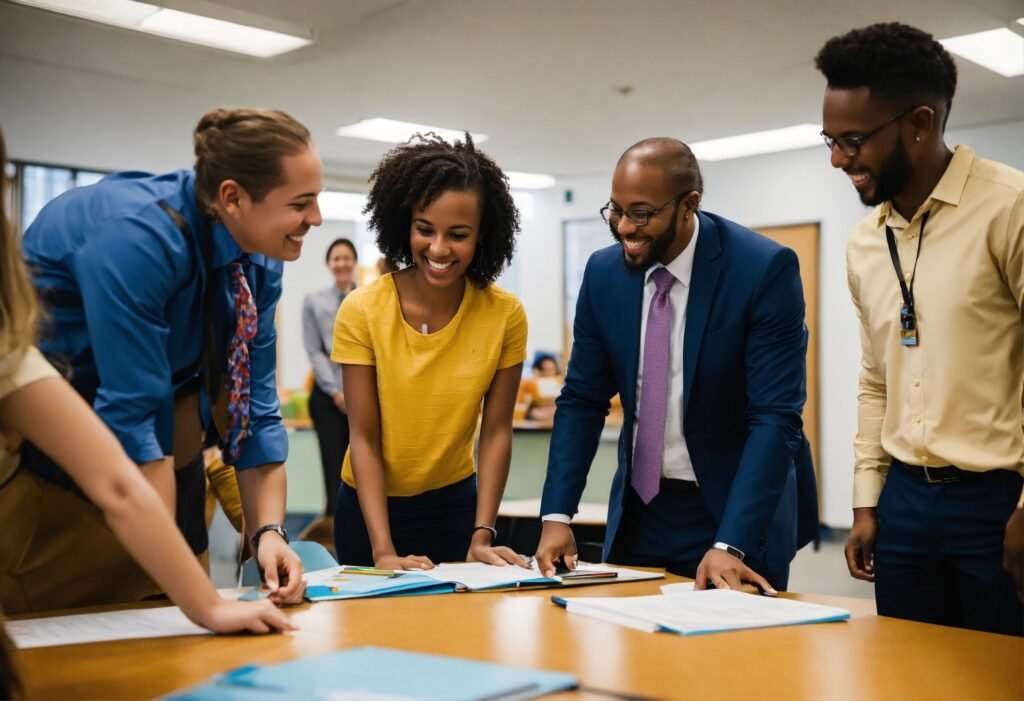Introduction
Graduating from college is a monumental achievement, but what comes next can be daunting. Navigating the transition from student life to the professional world requires guidance, resources, and support. This is where career services come in. These dedicated departments play a crucial role in helping students and graduates prepare for post-graduation success, equipping them with the tools needed to thrive in their chosen careers.
Understanding Career Services
Career services encompass a wide range of resources and support systems designed to assist students and alumni in making informed career decisions. These services are tailored to help individuals identify their career goals, develop necessary skills, and connect with potential employers.
Different Types of Career Services
Career services can vary widely depending on the institution, but they typically include career counseling, resume and cover letter assistance, interview preparation, job search strategies, networking opportunities, and more. These services are integral to helping students transition smoothly into the workforce.
The Evolution of Career Services
Historical Perspective
Traditionally, career services were limited to simple job placement assistance and basic resume help. Over time, however, the scope of these services has expanded significantly. The focus has shifted to a more holistic approach that addresses various aspects of career development.
Modern Career Services Trends
Today, career services are more dynamic and comprehensive. They incorporate the latest technology, such as AI-driven career assessments and virtual career fairs, to provide a more engaging and effective experience for students.

Key Components of Career Services
Career Counseling
Career counseling is a personalized service that helps students understand their career interests, strengths, and opportunities. Through one-on-one sessions, career counselors assist students in setting realistic career goals and developing a plan to achieve them.
Resume and Cover Letter Assistance
Crafting a compelling resume and cover letter is crucial in making a positive impression on potential employers. Career services offer guidance on how to create professional and customized documents that highlight a candidate’s strengths and experiences.
Interview Preparation
Interviews can be nerve-wracking, but thorough preparation can make a significant difference. Career services provide mock interviews, tips on answering common questions, and strategies for building confidence to help students excel during actual interviews.
Job Search Strategies
Finding the right job requires a strategic approach. Career services teach students how to effectively use online job portals, leverage social media for job searching, and tap into alumni networks to uncover opportunities.
Networking Opportunities
Building a professional network is essential for career growth. Career services organize career fairs, networking events, and informational interviews, giving students the chance to connect with industry professionals and potential employers.
Career Counseling: A Personalized Approach
Career counseling goes beyond generic advice. It involves personalized guidance tailored to an individual’s unique career aspirations and challenges.
One-on-One Sessions
In these sessions, students receive individualized attention and advice, allowing them to explore their interests, skills, and potential career paths in depth.
Career Assessments and Testing
Career assessments help students understand their strengths and how they align with different career options. These assessments can include personality tests, skill inventories, and interest surveys.
Setting Career Goals
With the help of a career counselor, students can set realistic and achievable career goals. This process involves identifying short-term and long-term objectives and creating a roadmap to reach them.

Resume and Cover Letter Assistance
A well-crafted resume and cover letter can set a candidate apart from the competition.
Crafting a Professional Resume
Career services offer workshops and individual feedback to help students create resumes that effectively showcase their skills, experiences, and accomplishments.
Tailoring Cover Letters
Cover letters should be tailored to each job application. Career services provide templates and examples to help students write compelling cover letters that align with the job they are applying for.
Importance of Customization
Generic resumes and cover letters rarely stand out. Career services emphasize the importance of customization to ensure each application is unique and targeted.
Interview Preparation: Nailing the First Impression
The interview is often the final hurdle before landing a job, and preparation is key.
Mock Interviews
Mock interviews simulate real interview scenarios, allowing students to practice their responses and receive feedback in a low-stress environment.
Common Interview Questions
Career services provide lists of common interview questions and tips on how to answer them effectively, helping students to articulate their skills and experiences confidently.
Building Confidence
Confidence is crucial during an interview. Career services offer techniques to help students build their self-confidence and present themselves positively.

Job Search Strategies: Effective Approaches
An effective job search strategy can significantly improve the chances of finding the right job.
Online Job Portals
Career services teach students how to use online job portals efficiently, including how to set up job alerts and optimize their profiles for better visibility.
Leveraging Social Media
Social media platforms like LinkedIn can be powerful tools for job searching. Career services provide tips on how to create professional profiles and network with industry professionals online.
Utilizing Alumni Networks
Alumni networks can be invaluable resources for job seekers. Career services help students connect with alumni who can provide insights, advice, and potential job leads.
Networking Opportunities: Building Connections
Networking is a key component of career success, and career services provide numerous opportunities for students to build their professional networks.
Career Fairs
Career fairs bring together employers and job seekers in one place, offering students the chance to learn about different companies, explore job openings, and make direct connections with recruiters.
Networking Events
Networking events are more informal gatherings where students can meet industry professionals, alumni, and peers to share experiences and opportunities.
Informational Interviews
Informational interviews allow students to learn about specific industries or companies by speaking directly with professionals. Career services often help arrange these meetings.
Internships and Work Experience
Gaining practical experience is crucial for career development.
Importance of Internships
Internships provide hands-on experience and a chance to apply academic knowledge in real-world settings. They also help students build professional networks and gain industry insights.
How Career Services Help Secure Internships
Career services assist students in finding and applying for internships through job boards, employer partnerships, and resume workshops.
Translating Experience into Job Offers
Career services help students articulate their internship experiences on their resumes and in interviews, increasing their chances of securing job offers after graduation.
Employer Partnerships and Job Placement
Strong relationships with employers are essential for effective career services.

Collaboration with Employers
Career services work closely with employers to understand their hiring needs and create opportunities for students, including internships, co-ops, and full-time positions.
On-Campus Recruitment
Many employers visit campuses to recruit students directly. Career services coordinate these visits and help students prepare for on-campus interviews.
Job Placement Success Stories
Success stories from previous students can inspire current students and demonstrate the effectiveness of career services in securing employment.
Workshops and Seminars
Continuous learning is vital for career success.
Skills Development Workshops
Workshops on topics like resume writing, interview skills, and professional etiquette help students develop essential job-searching skills.
Industry-Specific Seminars
Seminars focused on specific industries provide insights into trends, opportunities, and challenges within those fields.
Lifelong Learning Opportunities
Career services often offer resources for alumni, emphasizing the importance of lifelong learning and career development.
Career Services for Diverse Populations
Career services aim to support all students, regardless of their background.
Supporting Underrepresented Groups
Career services provide tailored support for underrepresented groups, helping them navigate unique challenges and access opportunities.
Services for International Students
International students face unique hurdles in job searching. Career services offer specialized support to help them understand work authorization, cultural differences, and job market trends.
Accessibility and Inclusivity
Career services strive to be inclusive, offering resources and support for students with disabilities to ensure everyone has equal access to career development opportunities.
Measuring the Impact of Career Services
Evaluating the effectiveness of career services is crucial for continuous improvement.
Success Metrics
Common metrics include job placement rates, student satisfaction surveys, and employer feedback.
Student and Alumni Feedback
Feedback from students and alumni helps career services understand their strengths and areas for improvement, leading to more effective services.
Continuous Improvement
Career services must continually evolve to meet the changing needs of students and the job market. This involves regularly updating resources, tools, and strategies.

Conclusion
Career services are an invaluable resource for students and graduates, providing guidance, tools, and opportunities to succeed in the professional world. By utilizing these services, students can navigate the transition from academia to the workforce more smoothly and confidently. So, don’t wait—take advantage of the career services available to you and set yourself up for post-graduation success.
FAQs
How early should students start using career services?
It’s beneficial to start using career services as early as possible, ideally in the first year of college. Early engagement allows students to explore career options, develop necessary skills, and build a professional network over time.
Can alumni access career services?
Yes, many institutions offer career services to alumni, providing continued support for career development, job searching, and networking.
What should I expect in a career counseling session?
In a career counseling session, you can expect personalized guidance on career exploration, goal setting, resume and cover letter feedback, interview preparation, and job search strategies.
How can career services help with graduate school applications?
Career services can assist with graduate school applications by providing advice on choosing programs, preparing application materials, writing personal statements, and preparing for interviews.
Are there any costs associated with using career services?
Typically, career services are offered free of charge to current students and often to alumni as well. However, it’s best to check with your specific institution for details.
